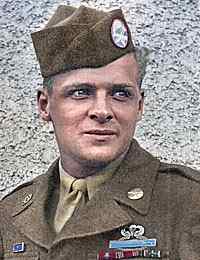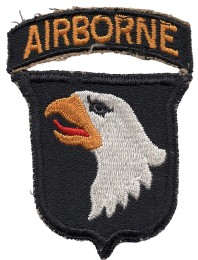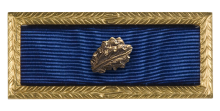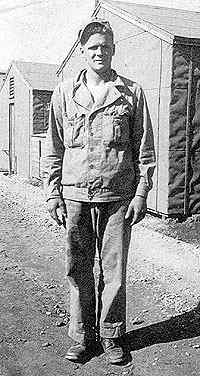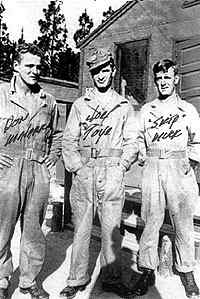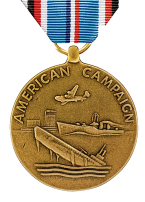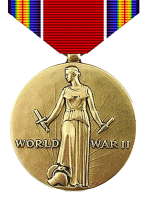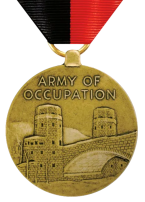Bill Guarnere, Joe Toye and I landed in the same field about 0,5 mile north of Sainte-Mere Eglise. We spent all night working our way to the coast. We captured an ammunition group of Germans during the night. We arrived at Le Grand Chemin just before the order came for “E” Company to attack the “Guns of Brecourt”. The results of that attack are well known except this. When we got back to the road I grabbed the mortar where I left it and put the tube on the ground between my legs and I started firing rounds at Brecourt where I could see the top of the roof. I let loose 7 or 8 rounds without knowing if I did any damage.
In September 1984 I returned to Brecourt Manor and after lunch in the Manor my wife and I were standing in the entrance yard when Michel de Vallavieille asked: “who fired the mortars down here?” I volunteered that I had. He then showed me shrapnel marks on the rock sides of the building. An after battle map the brothers had drawn following D-Day showed a number of bodies around the area in which we were standing. I do not know if I was responsible or not.
After capturing Carentan the company was in a defensive position. Dick Winters came down the line one day asking for a volunteer to take out a high noon patrol Nearing me he said: “Malarkey you are a new non-com (a military officer appointed from enlisted personnel) you just volunteered”. I was to report at noon to the company Command Post with Rod Bain, his 300 Radio and six riflemen. Lewis Nixon was at the C.P. and he’s the one who was ordering the patrol. He handed me a map showing a cluster of farm buildings about 0,5 miles west of us and 7,5 miles south. I had never had any training for a patrol, who I picked on it and so forth. The ones I remembered were Bain, John Sheehey, Ed Spein and Dick Davenport.
I would stay 4 or 5 yards behind the scout who would stop at each cross hedgerow and then we would change directions, always moving west or south and keeping the hedgerow between us and the target. When we had made about 10 jogs I stepped up behind John Sheehey, as I did I stepped on a dry twig, when it snapped a German helmet came up out of the hedgerow from out of a pit blind, he was looking to his left, John and I were about 10 feet away to his right. I pulled my carbine up, not firing but hitting Sheehey in the butt. He whipped up his Tommy Gun taking the German through the head.
I could see the farm buildings a couple of hundred yards away. I did not call Winters but ordered the patrol to run back the same way we came. Automatic weapons were firing at us randomly, however, we always had a hedgerow between us and any gunners. Rod Bain had a tough time with the 300 Radio as did Ed Spein with his real short legs. When we reached the Command Post, Nixon had left, probably getting a drink. Winters remarked that that was the last daylight patrol going out of here.
The rest of Normandy was pretty standard stuff except for John More finding the main supply stores at Utah Beach and securing cases of fruit for us to gorge ourselves on waiting for an L.S.T. to take us back to England and making that trip on our return to Aldbourne with a fancy motorcycle with side car.
The English summer of ’44 was pleasant with many missions scrubbed. Sobel sent word from someone else to tell Sgt. Malarkey and Alton More that I am not going to reclaim the motorcycle until they go into combat again. He would have come sooner but did not want to confront Dick Winters.
Holland
September 17th, 1944 brought our jump into Holland. I became acting platoon Sgt. Of the 2nd platoon when Bill Guarnere injured his leg in early October. In mid October Winters picked me up to take me to some headquarters. On the way he said I was to be a forward observer for a Corp of British Artillery. When I asked what I knew about that he said I did not need to know anything.
My outpost was to be in the orchard along the Rhine where we maintained nightly outposts. My mission was to observe German traffic west of Arnhem to Utrecht. On the night we were to take position, Rod Bain, Eugene Jackson and I were in the company mess with Winters for final instructions and food for the day. It was 3:00 am, in walks corporal Plesha who was supposed to maintain the outpost until we got there. When I asked him what the hell he was doing coming in early he responded he thought it was near daylight. The truth is he was getting nervous in the service.
We moved cautiously across the bottom land and reached the orchard without incident. I told Rod and Jackson to lie down and rest while I cut saplings with a machete to build a blind. When finished I laid down on the side of the ditch looking to the east, in about a half hour I could see the first speck of light. A short time later I saw something bob up the ditch, I kicked Rod and Jackson and jumped behind an orchard tree. When I challenged them there was no response, at the same time a dog was smelling the barrel of my Tommy Gun. Why I did not fire I do not know.
I challenged them again this time I saw a white handkerchief waved in the air. I sent Jackson up the ditch, he yelled there were 8 Germans. He belted one with his rifle when he found a P38 (a Luger Pistol) on him. They had dumped their weapons far up the ditch. Why they decided to surrender I do not know. I do know they had to come across the Rhine. I don' t know if Plesha knew that. I had Rod get Winters on the 300 Radio to find out if we should keep them here all day. He said to bring them in so they could be interrogated. I never did hear the end of the story about them. The dog came in with us.
In the later part of October the company was to be involved in the Rescue of British Paratroopers and some American Pilots from across the Rhine in a mission created by British Colonel Dobey. A protective force under Heyliger was to cross down river from the orchard. The 2nd platoon would have machine gunners on both sides of the orchard and the rest of the platoon would man the boats with British crews to return the escapees. I had the first boat across, I did not see any of the protective troops. I had to ask if they were the escapees. Everything went without a hitch and we escorted them to a reception area over the dike.
There was another unusual event in Holland involving an area we referred to as “Hell’s Corner”. It was the location that was at the junction of the railroad dike and the island dike. We would rotate platoons in and out of there. One night Winters came down to it and wanted myself and Rod Bain to go out to a wooded area to see what kind of German activity we could hear on the railroad dike.
We silently went out about 11:00 PM. About 15 minutes after we entered the woods mortar shells started hitting the trees. Winters called to ask what was going on. I replied tree bursts were occurring, so he ordered us out. The only thing I can surmise is that the Germans had some sophisticated listening device that would pick up the slightest sound.
Don Malarkey
